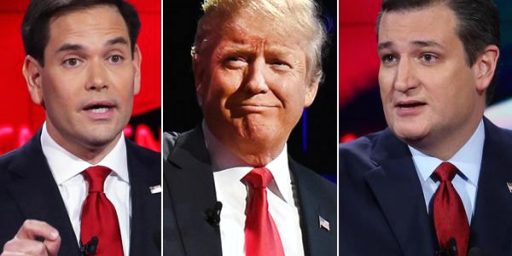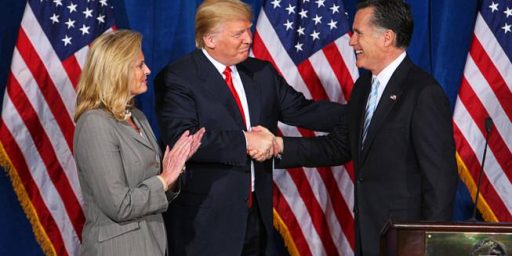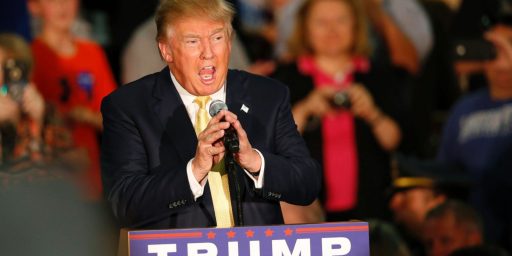Republicans Say They Want A “Conservative” Presidential Nominee
In a new Gallup poll, Republicans say they want a "conservative" as their Presidential nominee, but they may regret what happens if they get the kind of hard-right conservative they seem to be thinking of.
If a new Gallup poll is any indication, Republican voters who will be selecting a nominee starting in just about six weeks are looking for a conservative, which seems to bode well for anti-establishment candidates like Ted Cruz and Donald Trump and poorly for “establishment” candidates like Jeb Bush, Chris Christie, and John Kasich:
WASHINGTON, D.C. — The ideological profile of the ideal Republican presidential candidate looks much the same now as it did before the 2008 election. Six in 10 Republicans nationwide, including independents who lean toward the GOP, want the party to nominate a conservative to represent it in 2016. About one in three want a moderate candidate, while support for a liberal is in the single digits.
These findings, from a Dec. 2-6 Gallup poll, are similar to the results from a December 2007 poll. The current party nomination contest is arguably different from the one that produced 2008 nominee Sen. John McCain. Yet the percentage of Republicans who prefer a conservative candidate is not.
As the 2016 primary contests draw nearer, several of the more than dozen Republican presidential candidates continue to jockey for the unofficial status of being the race’s “true conservative.” The party’s front-runner, real estate mogul Donald Trump, has bucked the trend. Several of his views are not ideologically pure, but his positions on immigration — the marquee issue of his campaign — are arguably to the right of every other candidate in the race, and may explain his relatively strong appeal to very conservative Republicans.
While these numbers would seem to be good news for some candidates in the GOP field and bad news for others, Philip Bump at The Washington Post offers a caveat:
Ted Cruz’s recent ascension in the slowly thinning ranks of the Republican presidential field is largely attributable to his consolidating support from conservative voters (and the collapse of that support for Ben Carson).
So it’s good news for Cruz that a new poll from Gallup shows that a majority — 60 percent — of Republicans are looking for a conservative nominee for their party. Nearly a fifth want to nominate a “very conservative” candidate, which certainly seems to apply to Cruz.
There’s only one catch. The numbers were nearly identical in 2007, when the party went on to nominate the not-super-conservative John McCain.
Sixty percent of people said they wanted a conservative in December 2007, just like now, with 15 percent wanting a “very” conservative nominee. They got a very conservative vice presidential candidate, for what it’s worth.
Gallup doesn’t seem to have asked the same question in 2012, but it did ask which candidates were viewed as the most conservative. Michele Bachmann won that ranking, followed by Rick Perry, Rick Santorum and Newt Gingrich. And then came Mitt Romney, the eventual nominee
(…)
Republicans want a conservative. In the past two cycles, they’re gone with more moderate options. Although we’ll note that they’ve yet to reward the 1 percent of their party who keeps telling Gallup they’re looking for a “very liberal” Republican nominee.
Bump’s caveats are well-taken, and the fact that we’re still six weeks away from the Iowa Caucuses and New Hampshire Primary should be kept in mind as we look at poll numbers such as those from a Quinnipiac poll released yesterday that appears to show Ted Cruz moving further up in the ranks of the Republican candidates to get within four points of Donald Trump or the CNN/ORC poll released today that shows Trump with a larger lead. At the same time, though, it strikes me that there is something different about the 2016 cycle that makes the idea that conservatives in the GOP base will meekly accept a more moderate candidate may not end up being true this time.
For one thing, the caliber of ideologically “conservative” candidates in 2016 is arguably much stronger than it has been in the past, while the establishment candidates have far weaker.
In 2008, the most viable candidates that conservatives rallied around were Mitt Romney, who had just recently left office after serving a single term as Governor of Massachusetts, and Mike Huckabee, who had a long political resume as Governor of Arkansas but never seemed to have much appeal beyond the social conservatives in Iowa. Outside of those two candidates, the rest of the GOP field consisted of a bunch of also-rans and hangers-on who were obviously never going to be serious contenders for the nomination. For a time, it seemed like former Tennessee Senator Fred Thompson might be the conservative savior in 2008, but his campaign was, to borrow a phrase, so low energy that it was hard to tell he was actually running. This left Rudy Giuliani, who was hardly a conservative from the perspective of the GOP base, and John McCain. Once McCain won in New Hampshire and Giuliani’s plan to blaze a path to the nomination by winning Florida collapsed, the rest of the field essentially died away and Mitt Romney ended up using his appearance at 2008’s CPAC to announce his withdrawal from the race.
Things weren’t much better for conservatives in 2012. In that year, the viable conservative field was so slim that activists found themselves turning to Texas Governor Rick Perry to enter the race to become the conservative alternative to Mitt Romney since it seemed clear that candidates like Michele Bachmann, Herman Cain, Rick Santorum, and Newt Gingrich. Perry ended up entering the race in mid-August 2011 and quickly rose to the top of the field both in the polls and in fundraising, only to see it all come crashing down thanks to a series of bad debate performances and statements about immigration that put him outside the hard-right anti-immigrant position that many of the same people who had begged him to run held strongly to. After Perry, conservatives ended up boosting the fortunes of Herman Cain, Michele Bachmann, and then Rick Santorum and Newt Gingrich, the last two of which ended up staying in the race through much of the primary cycle but were never much more than an annoyance to Mitt Romney. In the end, conservatives put aside their doubts and got behind Romney, especially when he selected Wisconsin’s Paul Ryan as his running mate.
This time around, the pickings are arguably far better for conservatives than they have been in the past cycle. While Ben Carson is obviously not a serious candidate, one can’t really say the same thing about sitting Senators like Ted Cruz, Marco Rubio, and Rand Paul, and Donald Trump’s personal fortune and willingness to say anything conservatives want to hear whether he means it or not has made him a huge star. The establishment candidates, meanwhile, have all looked weak by comparison. Arguably, the fact that conservatives have a stable of acceptable candidates with much better resumes than they have seen in the past makes it less likely that they would be willing to give up quietly as they have in the past.
More than the quality of the candidates, the reason that Bump’s caveats may not apply this time around is the fact that the Republican Party has quite obviously become more hard-core conservative and, more importantly, more populist oriented than it was during either the 2008 or 2012 election cycles. While conservatives in the GOP base have been willing to accept an ‘establishment’ candidate in the past, the rise of the Tea Party, the frequent revolts against leadership in both the House and the Senate since the 2010 election and, perhaps mostly importantly, the phenomenon of the rise of Donald Trump during this election cycle seems to indicate that hard-core conservatives may not be willing to accept a compromise nominee like they were in the past. Especially telling in this regard is the fact that this wing of the party, as represented by many Tea Party groups and the talk radio crowd, seems to be lining up behind Texas Senator Ted Cruz right now, and rejecting a candidate like Marco Rubio who is arguably just as conservative as Cruz but also has shown the ability to court ties with the so-called ‘establishment’ wing of the party and to make compromises on issues like immigration reform. This is the wing of the party that both Cruz and Trump are appealing to right now, and if the people that make up that wing have their way then they may just get the “conservative” candidate they say they’ve been looking for.
The problem this creates for Republicans should be rather obvious, though. Say what you will about candidates like John McCain and Mitt Romney, but the fact of the matter is that, while they were arguably the most electable candidates in a General Election sense of all the candidates running in the years they won the GOP nomination. If the conservative wing of the party ends up getting its way with a nominee like Ted Cruz or Donald Trump, that won’t be true this time around. At that point, perhaps, they will finally get to test that the key to a Republican winning the White House is to nominate the most conservative candidate and see what happens. Based on everything we know about American politics, the odds are quite high that a Republican Party led by Ted Cruz or Donald Trump would likely find itself handed a loss at least as bad as the one that Michael Dukakis in the 1988 Presidential Election, and that they’d probably lose control of the Senate as they find themselves unable to hold on to even seats that, while somewhat at risk, are certainly winnable in an ordinary year. While it’s unlikely, such a Republican nominee could end up facing a year as disastrous as they did in 1964 or as Democrats did in 1972, 1980, or 1984. Perhaps the GOP needs a defeat like that, one that conservatives can’t blame on the nominee being “too moderate, to purge itself of the instincts that have pulled it this far to the right.







Perhaps the GOP needs a defeat like that, one that conservatives can’t blame on the nominee being “too moderate, to purge itself of the instincts that have pulled it this far to the right.
Haha. You know they’ll just blame the media, or “fraudulent votes” from illegal immigrants, or chemtrails, or some other nonsense, and continue apace. Crazy people with confirmation bias, cognitive dissonance, and a media industry dedicated to feeding their crazy for profit will never, ever learn. Anything.
Sorry, but the M.O. so far has been to double-down on the cray-cray. Hence Trump, Cruz & etc. One can hope for a splintering, perhaps moving the US to at least a three-party state.
@mantis:
You forgot the biggest factor of all: The KarlRove/GOPe/Establishment conspiracy, which is dedicated to a Hillary Clinton victory.
So when did ‘conservative’ become synonymous with ‘bat guano crazy’?
The Republican Party is being forced to deal with the bigoted, insane and paranoid base they started to cultivate back in the Nixon days. If Trump or Cruz get the nomination they will not only lose the presidency but take the Senate majority with them. Even if neither Trump or Cruz wins the nomination the two have soiled the Republican brand.
I’ve said it previously – Ted Cruz is the only “no more excuses” “non-RINO” candidate among the current Republican candidate crew (and no, I definitely don’t consider Ben Carson to be a viable candidate).
Maybe it’s time for Republicans to put an end to the decades long whining and excuses binge and nominate Ted Cruz.
I am always frustrated with polling questions. Instead of asking whether someone supports a label (like conservative, very conservative, etc) how about asking specific policy questions and then put the label on the results. Questions like:
Do you support putting more American troops into the Middle East?
Do you support turning Medicare into a voucher system?
Do you support cutting Social Security for those under 55?
Do you support the legalization of SSM?
Do you support a personhood amendment?
Etc, etc.
I bet you would get much more interesting results.
@Scott: If there’s one thing I’m sure of in political science, it’s that the average voter hasn’t a clue what “conservative” means. It’s well known that a majority of people identify as conservative and majorities respond liberal on most issues. “America is a center right nation” is complete BS.
I’ve been doing a little booking and I find that not only do voters not know what “conservative” means, active politicians don’t know, and reading conservative thinkers, they don’t know. Trump wants to build a wall and not allow Muslims into the country. He seems squishy on abortion and gays. He’s OK with taxing rich people. Cruz seems bigger on social issues, less nutso on immigration, and I have no idea on taxes. Little Jebbie! wants to cut rich peoples taxes, do nothing about AGW, and allow a path to citizenship. Who’s more conservative? Dyam if I know. And I’m pretty sure Gallup doesn’t know.
@gVOR08:
Yep, that is where I was heading. To most people, the label is most important; not the actual belief system underlying the label.
It’s certainly true that most people don’t know (and probably care to know even less) about the definition of conservative beyond “what I believe.” But what I see in the pattern shown above is that republicans want to want a conservative Presidential candidate, but don’t want to actually have one.
The problem with this type of poll is that it does not really tell us what the respondents thing “conservative” means. And, really, since “conservative” is an identity marker for Republicans it stands to reason that they would want a “conservative” candidate.
Hence:
@gVOR08:
Nonsense. It means “right-thinking”. Oh, and “liberal-hating”. What else could it mean?
I’d love to see Ted Cruz get the nomination and lose decisively to Hillary. That and losing the Senate just might shut up the rabid right wingers. Maybe they’d sober up from whatever the hell they’ve been mainlining ever since Bill Clinton first got elected.
I’d also love to get a free pony.
@MikeSJ: Not so, they will simply claim Cruz was not conservative enough.
I just checked and Dukakis got almost 45.7% of the popular vote, exactly what John McCain got in 2008. But since things were more distributed geographically in 2008, Dukakis suffered a bigger electoral landslide than McCain did; 173 electoral votes for McCain vs. 111 for Dukakis. McCain won twice as many states: 22 vs. 10.
No matter who the GOP nominates next year, they will do no worse than 46% of the popular vote, and 22 states. I don’t care if it’s Trump, Cruz, or Todd Shut-That-Thing-Down Akin: partisanship is not only much stronger than it was in 1988, it’s stronger even than in 2008. If the GOP ticket were Alex Jones with Joe Arpaio as his running mate, the vast majority of GOP voters – including the pretend “independents” who reliably vote GOP – would spend all summer telling themselves it’s not so bad and all revving themselves up to vote for America against the Marxist-Feminist menace of Hillary.
Look, that whack-job of a Lieutenant-Governor candidate in the 2013 VA state elections pulled 45% of the vote in an indigo state (purple shading to blue). That tells you where the floor really is. Both parties could choose their candidates from Fear Factor casting-call rejects and do just about as well as they would otherwise. In the first quarter of the 21st Century, Americans vote for the Party over the person.
@Jim Henley:
True.
So true.
The floor for *any* Republican candidate for President is going to be ~45%. If it’s the re-animated corpse of zombie Benedict Arnold who likes to eat Pomeranian puppies – the super adorable ones who smile at you with that freakishly human grin – during the debates on live TV, if he’s the R candidate, he’s going to pull 45% at the minimum.
However, re-animated Benedict Arnold live TV Pomeranian puppy-eating zombie v2.0 is going to run up those numbers by winning 70 – 30 or more in the Old Confederacy and the central Plains and the northern portion of the Mountain states. A relatively few states will poll something close to 50%. In most states it’s a washout one way or the other.
Re-animated Benedict Arnold zombie v2.0 has to win Ohio and Pennsylvania and Florida as well as all of the other predictable Republican-leaning states to even have a shot at the Electoral College win. If he loses Virginia or Iowa or Colorado or New Mexico it’s going to be an early night for the folks who don’t want to stay awake long enough to listen to the Benedict Arnold’s BRAAAAIINNS! concession speech. I don’t what his deal is, but that dude really likes brains.
But back to the premise of the OP. Other commenters have said it before me. Republican voters as a group are not “conservative” but favor radical, right-wing, loud-mouthed, ill-mannered, nativist, anti-Muslim, ass-kicking demagogues. Wake me up when that changes.
@Jim Henley:
BTW, give a big hidey-ho to Thoreau. He’s a good guy even if he is a Physicist.
Back when H&R used to be interesting (David Weigel era), when they were epic joe (now Joe From Lowell who regularly comments at LGM) vs. John rhetorical battles, Thoreau was always good for a good snarky comment.
My first minor was Linguistics. I understand that language is fluid, dynamic, and that usage changes over time.
But I also am the type who kinda stubbornly wants words to have a meaning that lasts more than that ephemeral, perceived understanding of what this collection of letters and phonemes actually means at the time it was uttered.
In other words, I’m an actual conservative. I prefer the world where words have a semi-static understood meaning.
This word – “conservative” – is one of the most loaded words in the English language. It has become the preferred word that American right-wing political people like to be called by and how they reference policies and politicians they prefer. Any traditional understanding of the word -slow-moving prudence that favors tradition over novelty – has basically been lost.
Anything that American right-wingers like is conservative and anything they dislike is not-conservative. The usage has evolved very quickly on this word.
@de stijl: And d*mn, Jim, you’re looking all muscled and shaven-headed butch 🙂
Aw, you guys.
And Thoreau is doing well last I checked. Thanks for the good word.